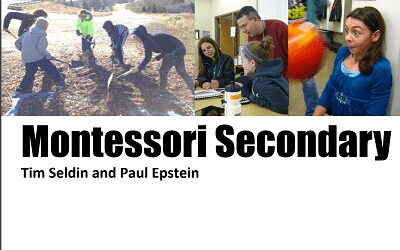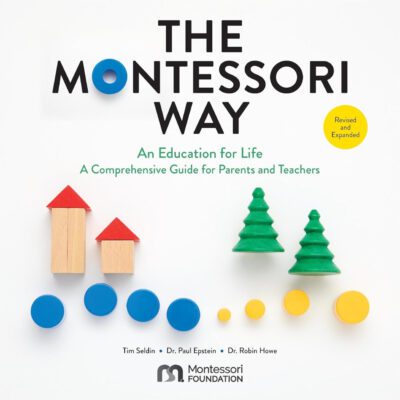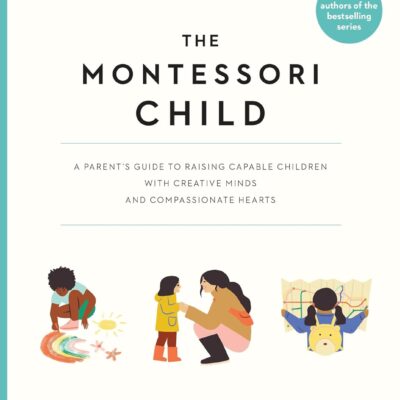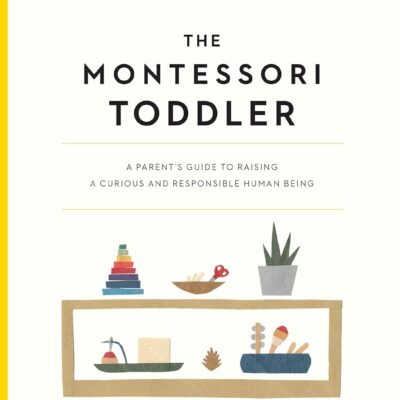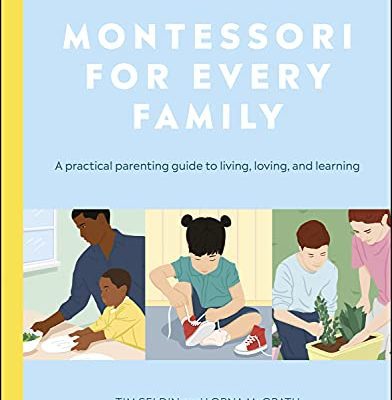On Cue Everyone, “Consider EQ before IQ”
by Dane Peters
“I knew I was a relatively smart guy, with an average or a little bit above average IQ, but I knew I had something going for me in my ability to connect with people, read situations, listen well, empathize, manage my impulses, and have pretty good follow-through. And I think I did well academically because I could do all those things.” 1
1 This quote is from Dr. Mitchel Adler, a keynote speaker, whom I met in Chicago at a conference; I also had the opportunity to interview him for an article, “Emotional Intelligence and Montessori Principles, Values, and Perspectives: An Interview with Mitchel Adler, PsyD.”
I love the quote above because it is an intelligence snapshot that speaks directly to the difference between EQ (Emotional Quotient) and IQ (Intelligence Quotient). Peters, Dane L., “Emotional Intelligence and Montessori Principles, Values, and Perspectives: An Interview with Mitchel Adler, PsyD,” Montessori Life, Winter 2015-16 2 Lillard, Angeline Stoll, Montessori: The Science Behind the Genius, Oxford University Press, 2005, p. 199
As we explore emotional intelligence in our Montessori world, it is important to reflect on the role ‘modeling’ plays, especially as it pertains to leadership, whether it applies to children in the three-year cycle, or a head of school modeling for faculty, staff, parents, and trustees. “Children also can learn about social behavior in Montessori classrooms by observing how others behave in natural, non-scripted situations. Whereas in traditional classrooms, children learn how to sit still and listen to the teacher, in Montessori, they can learn how to interact with each other. The oldest children in the classroom can serve as examples to the younger ones.” 2
I also want to highlight the importance of grace and courtesy in relationships and leadership. Back in 2016, I wrote “Lead With Grace & Courtesy,” published in Montessori Leadership. 3
I have found that grace, courtesy, and role modeling are critical to EQ coming before IQ.sIn my talks as a consultant to schools, I often refer to the history of intelligence quotients—both EQ and IQ.
In a recent International Montessori Council Webcast, “Leading with Emotional Intelligence,” I talked about the history of intelligence. Let me do a brief summary, so that we can better understand the evolution of the two. Do keep in mind that Emotional Intelligence (EI) is interchangeable with Emotional Quotient (EQ).
1949 – One of the earliest methods of measuring intelligence was through the use of the WISC (Wechsler Intelligence Scale for Children) that was developed by David Wechsler. The test is an individually administered intelligence test for children between the ages of 6 and 16. It was the test to assess how ‘smart’ a child was beyond school assessments and gave an IQ score in the range of 69 and below (Extremely Low) to 130 and above (Very Superior). H1980s – Howard Gardner introduced the idea that people have multiple intelligences beyond the WISC IQ standards as noted below. In 1983 he presented the groundwork for thinking beyond IQ with his popular book Frames of Mind.
- logical-mathematical
- inguistic-verbal
- spatial-visual
- body-kinesthetic
- existential
- musical
- interpersonal
- intrapersonal, and
- naturalistic intelligence
As a side note, while I was head of a Brooklyn Heights Montessori School, he joined the faculty for lunch, shared his wisdom with us, and was so well received.
1990 – Peter Salovey and John D. Mayer coined the term “personal intelligence”; it eventually became “emotional intelligence,” describing it as “a form of social intelligence that involves the ability to monitor one’s own and others’ feelings and emotions, to discriminate among them, and to use this information to guide one’s thinking and action.” Mayer’s book, Personal Intelligence – The Power of Personality and How It Shapes Our Lives became the springboard for the one who brought EI to the forefront of the study of intelligences.
1995 – Daniel Goleman was the loud speaker for EI / EQ when he authored the internationally best-selling book Emotional Intelligence, which spent more than one-and-a-half years on The New York Times best seller list. On the cover of the book’s 10th anniversary edition, it states: “Why it can matter more than IQ.”
2007 – Stanford professor, Carol Dweck, clarified measured intelligence in her revolutionary book Mindset: The New Psychology of Success. She helped us understand that individual intelligence can have a “fixed” or “growth” mindset. She helped us understand that intelligence does not have to remain stationary — or fixed — throughout life; in fact, intelligence can grow throughout life.
When I saw her at a conference, I was taken by her thoughtful and clear understanding of intelligences. She asked the question, “Are we raising our children for now or the future?” Watch her excellent YouTube video, Developing a Growth Mindset with Carol Dweck for an uplifting, enlightening view into her important work.
Considering Emotional Intelligence 2.0 4
Let us now look at EQ through this popular diagram from Goleman’s book that represents the four core emotional intelligence skills:
SELF AWARENESS
SELF MANAGEMENT
SOCIAL AWARENESS
RELATIONSHIP MANAGEMENT
To dive deeper into these skills, make it a point to read the book. My recommendation comes from an EQ perspective. I know how busy educators are these days with school, family, and personal life; the book is short, to the point, and an easy read that is most helpful in understanding EQ and the advantages that it has over IQ. Do give it a try, if you haven’t already. In the meantime, here are a few EQ considerations to think about: oConsider John Bariso’s 13 signs of high emotional intelligence 5
3 Peters, Dane L., “Lead With Grace & Courtesy,” Montessori Leadership, International Montessori Council, Volume 18, Issue 3, 2016
4 Bradberry, Travis & Greaves, Travis, Emotional Intelligence 2.0, TalentSmart, 2009
5 Bariso, Justin, “13 signs you are highly emotionally intelligent,” FLIPBOARD – Business Insider, March 1, 2018
Considering EMPATHY
Empathy and compassion are important parts of emotional intelligence. Donna Orem, NAIS (President of the National Association of Independent Schools) stated in her NAIS article “The Power of Empathy in Leadership and Governance” Recently, I read The Empathy Factor, and one line from the book encapsulated the key learning for me: ‘The main reason organizations that try to manage change fail is their tendency to treat human systems as though they were mechanical processes. We are all human. When we work from a place of understanding, we thrive, and our work prospers. 6
According to psychologist Mary Ainsworth, quoted in Angeline Lillard’s book Montessori: The Science Behind the Genius, “A second feature necessary to accurate interpretation, according to Ainsworth, is empathy. Adults who lack empathy, she said, would have detached, intellectual relations with babies instead of warm, sensitive ones.” 7
Considering HUMOR
In an excellent NYTimes article “Laughter May Be Effective Medicine for These Trying Times,” Dr. Miller said, ‘Having a good sense of humor is an excellent way to relieve stress and anxiety and bring back a sense of normalcy during these turbulent times.’ 8
Author Daniel Pink highly recommends the recently released book Humor, Seriously: Why Humor is a Secret Weapon in Business and Life 9
When you open the cover and read the inside flap, it states,“Top executives are in on the secret: 98 percent prefer employees with a sense of humor, and 84 percent believe that these employees do better work.” Also, the book is particularly thorough on talking about humor and its relationship to EI. Here is one example: “Having a sense of humor—both the ability to generate humor and to appreciate it—has repeatedly been found to correlate with measures of intelligence.” In the end, ask yourself, “How do I feel about the importance of humor in my school?” As a quick, recent example of considering humor in the hiring process, a staff appointment to NYSAIS (New York State Association of Independent Schools) was announced in a February 8, 2021 letter written by Mark Lauria, Executive Director, about the new hire, “Of course, a strong interest in building ‘community’ and a good sense of humor were also important!”
6 Orem, Donna, “The Power of Empathy in Leadership and Governance,” March 21, 2016
7 Lillard, Angeline Stoll, Montessori The Science Behind the Genius, Oxford University Press, 2005, p. 262
8 Richard Schiffman, “Laughter May Be Effective Medicine for These Trying Times,” New York Times, October 2, 2020
9 Jennifer Aaker & Naomi Bagdonas, Humor, Seriously: Why Humor is a Secret Weapon in Business and Life, Random House, 2021
Considering TRUST
Rolling into trust . . . Humor, Seriously states “Laughter triggers the release of oxytocin, often referred to as the “trust hormone” because of the way it prompts our brain to create emotional bonds.” 9 Emotional Intelligence 2.0 is clear about trust: “Trust is something that takes time to build, can be lost in seconds, and may be our most important and most difficult objective in managing our relationships.” The book then goes on to detail how trust is built?
1. Open communication
2. Willingness to share
3. Consistency in words, actions, and behavior over time
4. Reliability in following through on the agreements of the relationship
Considerations on why EQ comes before IQ
1) “When I compared star performers with average ones in senior leadership positions, nearly 90 percent of the difference in their profiles was attributable to emotional intelligence factors rather than cognitive abilities.” 10
2) Probably the most important aspect of having and using emotional intelligence is that in a school community, we are modeling these characteristics for the children and our colleagues on a daily basis. I believe it is the best way to teach: be a good role model.
In closing, the big reason why I believe we should take the cue “Consider EQ before IQ” is that the opening quote of this article could have come from me . . . except the part when Mitchel says, “And I think I did well academically because I could do all those things.” I was not a good student, but I loved to connect with people. I can remember being called into the Dean of Students’ office in the beginning of the spring semester of my freshman year of college. She said, “Dane, we have got to do something, your GPA (Grade Point Average) is at 1.48 out of 4.00. If you don’t bring it up, we will not be able to allow you to return next semester.” The fact that I was class president and playing two sports did not matter. I gulped and said that I would get on it right away, and I did—at least enough so that I was able to return and graduate three years later. Finally, a pertinent confession that, for me, validates EQ before IQ; it is clearly spelled out in an article I wrote in 2009, “930: A Secret Whose Time Has Come”. 11
9 Jennifer Aaker & Naomi Bagdonas, Humor, Seriously: Why Humor is a Secret Weapon in Business and Life, Random House, 2021
10 Harvard Business Review Guide to Emotional Intelligence, Harvard Business Review Press, 2017
11 Peters, Dane L., “930: A Secret Whose Time Has Come,” AMS Newsletter, Sept. 2009

Dane L. Peters Right after college, Dane Peters served as a Captain in the U. S. Marine Corps, and 40 years later, he retired as head of Brooklyn Heights Montessori School (BHMS), a toddler through eighth-grade school in Brooklyn, New York. Prior to heading BHMS for eleven years, he served as head of Mooreland Hill School in Connecticut for eleven years. He recently completed his service as the administrator for the New York State Association of Independent School’s (NYSAIS) Experienced Leaders Advising Schools program. He is currently teaching and serves on the Advisory Committee for the American Montessori Society’s (AMS) Emerging Leaders Fellowship program. Dane has written over 100 articles that have appeared in 30 different publications. His first book, Independent by Design, was published in 2014. His second book, Design for Independence, Inspiration, and Innovation: The New York State Association of Independent Schools at 70, was published in 2017. You can read many of his articles on his blog (www.danesedblog.blogspot.com).

